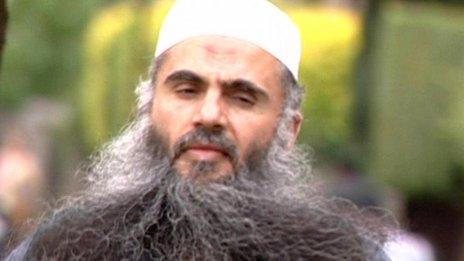Abu Qatada: Can he get a fair trial in Jordan?
- Published
June Kelly travelled to Jordan to try and find out if Abu Qatada would get a fair trial there
The radical cleric Abu Qatada has lost a bail application - offering hope to the British government that his deportation to Jordan is a step closer. But what treatment does he face if he is sent back to Jordan to face retrial on terrorism offences?
On a busy road close to the centre of Amman, tucked away between shops selling bathroom fittings is a small cafe which has been in Abu Qatada's family for years.
Years ago the young Omar Othman, as he was then known, cooked and served the falafel and hummus. Today it is his younger brother Ibrahim who prepares the food.
As he drops the chick peas into the deep fat fryer he explains that he doesn't want to do an interview.
Family friend Marwan Shehadeh, is among the few close to the Othmans willing to talk. He says they are "all afraid" that Abu Qatada will not get a fair trial.
"It is not depending on the trial itself," he says, "but on the conditions he will face in jail and how they will deal with him during interrogations."
'Fair trial'
The government's battle to deport Abu Qatada recently reached a critical moment when his case at the European Court of Human Right came to an end.
The UK won on almost every point. But the judges stated that the cleric would not get a fair trial in Jordan if the proceedings included evidence obtained by torture of others.
After weeks of diplomatic negotiations, Home Secretary Theresa May told MPs that "significant recent developments" in Jordan meant the cleric could be sent - without breaching his human rights - to the country from which he fled two decades ago.
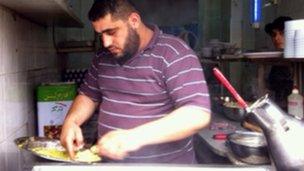
Ibrahim Othman: Family won't talk about the preacher
Kamel Al Said, Jordan's minister for legal affairs, told the BBC: "I want to assure everyone that justice will take its course in the prosecution of Abu Qatada.
"He will be treated fairly in a trial that will be open to the public. There's no need to be worried about the fairness of this court. It will act according to the law."
But that does not satisfy Abu Qatada's family and friends.
Mr Shehadeh, a friend for nearly 30 years, says Abu Qatada's views on whether there could be religious justification for violence hardened because of the Israel-Palestinian conflict and the extreme opinions of some of the prisoners the young imam encountered during his duties in a military prison.
In the early 1990s Abu Qatada left for Pakistan and from there he fled to Britain where he was given asylum because of concerns over his mistreatment in Jordan.
His exile in London did not stop the Jordanian authorities putting him on trial for conspiracy in two terrorist plots in Jordan. He was sentenced in his absence to life for his role in the bombing of a hotel and a school in Amman.
'Truthful testimony'
As part of the agreement reached with Jordan, the British government said those convictions would be quashed as soon as he arrives back in Amman - but that he would be retried.
That's because the UK courts have accepted the original convictions relied upon confessions from two witnesses who were tortured. Last year Jordan's King Abdullah pardoned both witnesses. If Abu Qatada is retried, they could be called to give evidence again and, according to Theresa May, they would be free to "give truthful testimony".
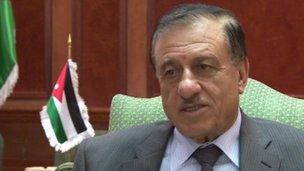
Jordan's minister for legal affairs says Abu Qatada will receive a fair trial
Musa Abdullat, the lawyer for one of the men, says that his client has been in and out detention since the pardon because he took part in a demonstration against the imprisonment of Islamists.
Despite a recent change to the Jordanian constitution banning torture - a key factor in the UK's case for deportation - Mr Abdullat says his client has been beaten in custody.
"I love my country and I love the king," he told the BBC. "But the reality is very ugly. There is torture, there is mistreatment and there is aggression against people's rights.
"Unfortunately after the changes to the constitution there was no change in respect of human rights. The situation is bad and is getting worse."
But this is denied by the Jordanian authorities. Government minister Kamel Al Said says such talk is exaggerated, and that if people are accused of mistreating detainees they will be investigated and prosecuted.
Court visit
We went to see for ourselves the state security court where the protesters are being tried. This is the same court where Abu Qatada may finally face Jordanian justice if he is kicked out of the UK.
The main court sits on the crest of a steep hill in the Marka district of the city. Military helicopters circle above, heading in and out of the headquarters of the Jordanian Army which is across the road.
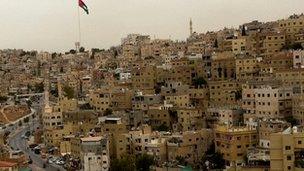
Jordan's capital Amman: Recent constitutional changes
We walked past a soldier in a watchtower on a corner of the court building and approached the front entrance which is manned by soldiers at a checkpoint. Could we go in to see the court for ourselves, to learn about how it goes about its business?
The soldiers told us we were not allowed to film in the area and we couldn't go inside. We were told to leave.
What we do know is that cases at the state security court are brought by a public prosecutor who is a military officer appearing before a panel of three judges. In terrorism cases, one or two of the panel are from the Army.
But Kamel Al Said, from the government, said: "This is not a military court. It is completely independent."
According to Home Secretary Theresa May, this is not "a quasi-military court but a key part of the Jordanian legal system".
She said in Abu Qatada's case there would be a public trial "with civilian judges". Home Office lawyers told an earlier hearing in the case that there would be "a majority of civilian judges".
Torture claim
In its 2012 report into human rights around the world, Amnesty International concluded that Jordan's recent constitutional changes, if they are implemented, would improve protections of civil and political rights in the kingdom. But it stressed that trials continued before the state security court and that its procedures "did not satisfy international standards for fair trial".
There have been further reforms since then and a number of high-level meetings between London and Amman led to a fresh assurance that Abu Qatada would be fairly tried. But at the same time as this shuttle diplomacy, there was growing political instability culminating in King Abdullah sacking the government in February.
The European Court's judgement in January led Mohammed al-Mousa to resign from his post at the Adaleh Centre for Human Rights, the body that monitors the treatment of any detainees deported from the UK to Jordan.
Its role was created as part of the Memorandum of Understanding signed by the UK and Jordan. But Mr al-Mousa says the centre should have refused to get involved in the Abu Qatada case after the Strasbourg ruling.
Mr al-Mousa says: "Torture is committed systematically in Jordan. The priority is always to get convictions from confessions rather than from evidence. This is the reality."
No one from the centre was available for comment but the Home Office has argued that it will play an important role in making sure Abu Qatada is not mistreated if, after a legal marathon, he is finally returned to Jordan.
- Published28 May 2012
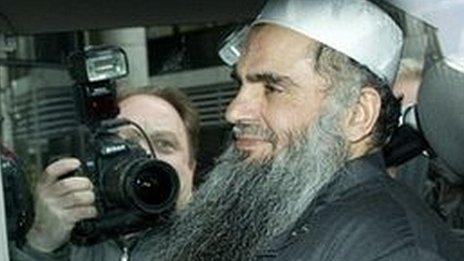
- Published9 May 2012
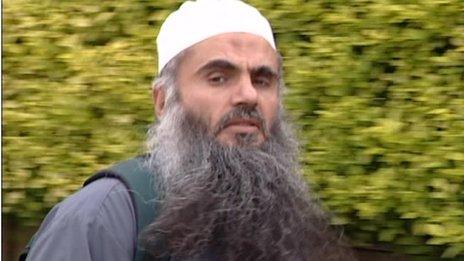
- Published26 June 2014
